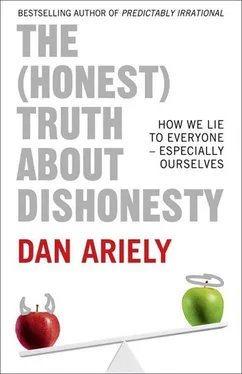Ariely, Dan - The (Honest) Truth About Dishonesty - How We Lie to Everyone – Especially Ourselves
Здесь есть возможность читать онлайн «Ariely, Dan - The (Honest) Truth About Dishonesty - How We Lie to Everyone – Especially Ourselves» весь текст электронной книги совершенно бесплатно (целиком полную версию без сокращений). В некоторых случаях можно слушать аудио, скачать через торрент в формате fb2 и присутствует краткое содержание. Жанр: Старинная литература, на английском языке. Описание произведения, (предисловие) а так же отзывы посетителей доступны на портале библиотеки ЛибКат.
- Название:The (Honest) Truth About Dishonesty: How We Lie to Everyone – Especially Ourselves
- Автор:
- Жанр:
- Год:неизвестен
- ISBN:нет данных
- Рейтинг книги:4 / 5. Голосов: 1
-
Избранное:Добавить в избранное
- Отзывы:
-
Ваша оценка:
- 80
- 1
- 2
- 3
- 4
- 5
The (Honest) Truth About Dishonesty: How We Lie to Everyone – Especially Ourselves: краткое содержание, описание и аннотация
Предлагаем к чтению аннотацию, описание, краткое содержание или предисловие (зависит от того, что написал сам автор книги «The (Honest) Truth About Dishonesty: How We Lie to Everyone – Especially Ourselves»). Если вы не нашли необходимую информацию о книге — напишите в комментариях, мы постараемся отыскать её.
The (Honest) Truth About Dishonesty: How We Lie to Everyone – Especially Ourselves — читать онлайн бесплатно полную книгу (весь текст) целиком
Ниже представлен текст книги, разбитый по страницам. Система сохранения места последней прочитанной страницы, позволяет с удобством читать онлайн бесплатно книгу «The (Honest) Truth About Dishonesty: How We Lie to Everyone – Especially Ourselves», без необходимости каждый раз заново искать на чём Вы остановились. Поставьте закладку, и сможете в любой момент перейти на страницу, на которой закончили чтение.
Интервал:
Закладка:
IT SEEMS, THEN,that the clothes do make the man (or woman) and that wearing knockoffs does have an effect on ethical decisions. As is the case with many findings in social science research, there are ways to use this information for both good and ill. On the negative side, one can imagine how organizations could use this principle to loosen the morality of their employees such that they will find it easier to “fake out” their customers, suppliers, regulators, and competitors and, by doing so, increase the company’s revenue at the expense of the other parties. On the positive side, understanding how slippery slopes operate can direct us to pay more attention to early cases of transgression and help us apply the brakes before it’s too late.
Up to No Good
Having completed these experiments, Francesca, Mike, and I had evidence that wearing counterfeits colors the way we view ourselves and that once we are painted as cheaters in our own eyes, we start behaving in more dishonest ways. This led us to another question: if wearing counterfeits changes the way we view our own behavior, does it also cause us to be more suspicious of others?
To find out, we asked another group of participants to put on what we told them were either real or counterfeit Chloé sunglasses. Again, they dutifully walked the hall examining different posters and views from the windows. However, when we called them back to the lab, we did not ask them to perform our matrix or dots task. Instead, we asked them to fill out a rather long survey with their sunglasses on. In this survey, we asked a bunch of irrelevant questions (filler questions) that are meant to obscure the real goal of the study. Among the filler questions, we included three sets of questions designed to measure how our respondents interpreted and evaluated the morality of others.
The questions in set A asked participants to estimate the likelihood that people they know might engage in various ethically questionable behaviors. The questions in set B asked them to estimate the likelihood that when people say particular phrases, they are lying. Finally, set C presented participants with two scenarios depicting someone who has the opportunity to behave dishonestly, and they were asked to estimate the likelihood that the person in the scenario would take the opportunity to cheat. Here are the questions from all three sets:
Set A: How likely are people you know to engage in the following behaviors?
Stand in the express line with too many groceries.
Try to board a plane before their group number is called.
Inflate their business expense report.
Tell their supervisor that progress has been made on a project when none has been made.
Take home office supplies from work.
Lie to an insurance company about the value of goods that were damaged.
Buy a garment, wear it, and return it.
Lie to their partner about the number of sex partners they have had.
Set B: When the following lines are uttered, how likely is it that they are a lie?
Sorry I’m late, traffic was terrible.
My GPA is 4.0.
It was good meeting you. Let’s have lunch sometime.
Sure, I’ll start working on that tonight.
Yes, John was with me last night.
I thought I already sent that e-mail out. I am sure I did.
Set C: How likely are these individuals to take the action described?
Steve is the operations manager of a firm that produces pesticides and fertilizers for lawns and gardens. A certain toxic chemical is going to be banned in a year, and for this reason is extremely cheap now. If Steve buys this chemical and produces and distributes his product fast enough, he will be able to make a very nice profit. Please estimate the likelihood that Steve will sell this chemical while it is still legal.
Dale is the operations manager of a firm that produces health foods. One of their organic fruit beverages has 109 calories per serving. Dale knows that people are sensitive to crossing the critical threshold of 100 calories. He could decrease the serving size by 10 percent. The label will then say that each serving has 98 calories, and the fine print will say that each bottle contains 2.2 servings. Please estimate the likelihood that Dale will cut the serving size to avoid crossing the 100-calorie-per-serving threshold.
What were the results? You guessed it. When reflecting on the behavior of people they know (set A), participants in the counterfeit condition judged their acquaintances to be more likely to behave dishonestly than did participants in the authentic condition. They also interpreted the list of common excuses (set B) as more likely to be lies, and judged the actor in the two scenarios (set C) as being more likely to choose the shadier option. In the end, we concluded that counterfeit products not only tend to make us more dishonest; they cause us to view others as less than honest as well.
Fake It Till You Make It
So what can we do with all of these results?
First, let’s think about high-fashion companies, which have been up in arms about counterfeits for years. It may be difficult to sympathize with them; you might think that outside their immediate circle, no one should really care about the “woes” of high-end designers who cater to the wealthy. When tempted to buy a fake Prada bag, you might say to yourself, “Well, designer products are too expensive, and it’s silly to pay for the real thing.” You might say, “I wouldn’t consider buying the real product anyway, so the designer isn’t really losing any money.” Or maybe you would say, “Those fashion companies make so much money that a few people buying fake products won’t really make a difference.” Whatever rationalizations we come up with—and we are all very good at rationalizing our actions so that they are in line with our selfish motives—it’s difficult to find many people who feel that the alarm on the part of high-fashion companies is of grave personal concern.
But our results show that there’s another, more insidious story here. High-fashion companies aren’t the only ones paying a price for counterfeits. Thanks to self-signaling and the what-the-hell effect, a single act of dishonesty can change a person’s behavior from that point onward. What’s more, if it’s an act of dishonesty that comes with a built-in reminder (think about fake sunglasses with a big “Gucci” stamped on the side), the downstream influence could be long-lived and substantial. Ultimately, this means that we all pay a price for counterfeits in terms of moral currency; “faking it” changes our behavior, our self-image, and the way we view others around us. *
Consider, for example, the fact that academic diplomas hang in many executive suites around the world and decorate even more résumés. A few years ago, The Wall Street Journal ran a piece on executives who misrepresent their academic credentials, pointing to top moguls such as Kenneth Keiser, who at the time was the president and COO of PepsiAmericas, Inc. Though Keiser had attended Michigan State University, he never graduated; still, for a long time, he signed off on papers that claimed he had a BA from Michigan State 1(of course, it is possible that this was just a misunderstanding).
Or consider the case of Marilee Jones, who coauthored a popular guidebook called Less Stress, More Success: A New Approach to Guiding Your Teen Through College Admissions and Beyond , in which, among other things, she advocated “being yourself” in order to be successful in college admissions and job searches. She was MIT’s popular dean of admissions, and for twenty-five years, by all accounts, she did her job very well. There was just one problem: she had added several fictitious degrees to her résumé to land that job in the first place. It was an act of cheating, pure and simple. The irony of her fall from grace was not lost on Jones, who apologized for not “having the courage” to correct the “mistakes” on her fake résumé at any point during her employment. When an extremely popular advocate of “being yourself” is toppled by false credentials, what are the rest of us to think?
Читать дальшеИнтервал:
Закладка:
Похожие книги на «The (Honest) Truth About Dishonesty: How We Lie to Everyone – Especially Ourselves»
Представляем Вашему вниманию похожие книги на «The (Honest) Truth About Dishonesty: How We Lie to Everyone – Especially Ourselves» списком для выбора. Мы отобрали схожую по названию и смыслу литературу в надежде предоставить читателям больше вариантов отыскать новые, интересные, ещё непрочитанные произведения.
Обсуждение, отзывы о книге «The (Honest) Truth About Dishonesty: How We Lie to Everyone – Especially Ourselves» и просто собственные мнения читателей. Оставьте ваши комментарии, напишите, что Вы думаете о произведении, его смысле или главных героях. Укажите что конкретно понравилось, а что нет, и почему Вы так считаете.












